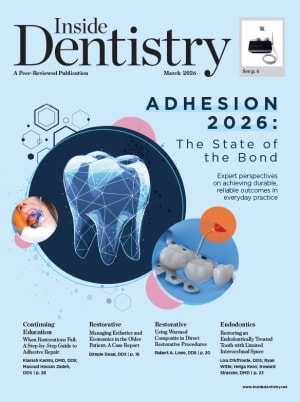Customized Care for Patients With Specific Needs
Patients with developmental disabilities, severe dental anxiety, and other unique needs can and should be treated in traditional practice settings
Whitney Deitz, DMD
During my general practice residency, I treated patients who presented with a variety of specific needs regarding the delivery of care. These patients, whether they had developmental disabilities, such as autism, or severe dental anxiety, had a tremendous need for treatment but experienced extremely limited access. Working with this patient population opened my eyes to my responsibility as a care provider. If every dentist in a traditional practice setting refuses to treat patients with specific needs, then we are failing to fulfill our responsibility as providers. It's easy to provide a referral to a university, but that is simply offloading care to a location that is much more limited, expensive, and often inaccessible for those who are truly in need.
Fear of dental treatment affects more than one third of US citizens.1 Furthermore, more than two thirds of patients with autism experience dental anxiety.2 These are significant proportions, and the issues are compounded by the fact that patients with autism often display parafunctional habits, such as bruxism and gum picking.3 Unfortunately, all of this means that there is a large population of people who desperately need care but have difficulty accessing it. Oral healthcare is an important component of maintaining one's overall health and well-being, so increasing awareness of this issue and inviting patients with specific needs into our practices is absolutely critical. As a profession, we need to start saying "yes" to these patients.
The Current State of Care
In general, dentists in traditional settings are hesitant to work with patients with specific needs, whether that is due to a lack of education, fear of losing revenue, or limited emotional energy. Whatever the reason, when faced with such patients, many dentists will refer them to a university for care, where they can be treated under general anesthesia.
Unfortunately, in this care pathway, everything is in short supply. The providers, care locations, and even the types of treatments available are limited. Moreover, seeking care at a university can be expensive, and for families who cannot travel or take time off work, it may be virtually impossible. Even if patients are able to access care in this way, they are unlikely to be able to receive dental treatment more than once a year, which isn't frequent enough. As dentists, we can do better by this population. All it takes is a bit of courage and patience.
Providing Care in Traditional Practice Settings
When you open your mind and your practice to treating patients with specific needs, you may not always know ahead of time what those needs will be. In my practices, we figure everything out during a patient's first visit.
Most of the time, these patients are presenting with a parent or guardian. My first step is to build trust with the guardian and establish a connection with the patient. I make sure to set the right expectations, and then I try for an easy win, such as getting the patient to say "ahh." If we can accomplish something simple first, it helps build everyone's confidence.
After that, treatment becomes a matter of connecting with these patients so that they can cooperate for short time periods. Even though the dentistry is the same, it requires a slightly different method of delivery. For example, I tend to use a stronger topical anesthetic to numb these patients, and I often use a bite block, but I call it a "tooth pillow." Treating patients with specific needs usually requires a lot of physical reassurance, eye contact, and verbal walkthroughs. I try to use patients' names as much as possible and provide countdowns, so they know what's happening. I may say something like, "Alright, John, this is going to take 10 seconds. You're going to hear a loud noise, then you're going to feel a lot of water, then you'll hear ‘Mr. Slurpy' taking all of the water out of your mouth, and then I'll give you a break. Here we go. This is what it sounds like. Let's count down."
Don't Fear Failure
This approach can be very effective, but you also have to be unafraid to fail. Remember, just taking the time and effort to try to treat patients with specific needs is regarded as invaluable to the families of these patients who are looking for care. Giving any patient a reason to smile is rewarding. However, saying "yes" to patients who need customized care and then providing that treatment is not only rewarding but also instrumental in helping to initiate a massive shift toward care expansion for a vulnerable population.
About the Author
Whitney Deitz, DMD, is an Aspen Dental practice owner in Owensboro, Kentucky. She is passionate about providing the best possible care to all of her patients, including those with specific dental needs.
